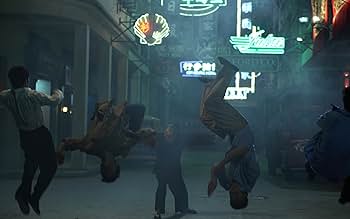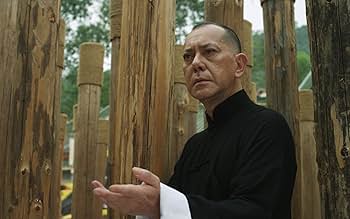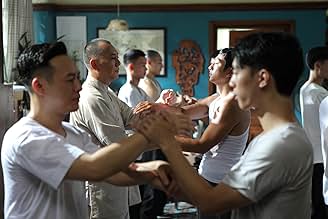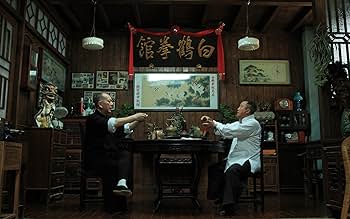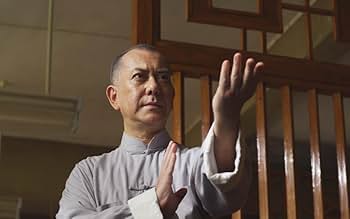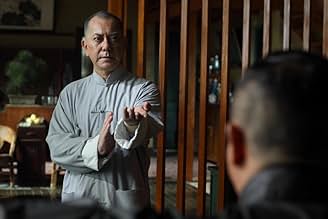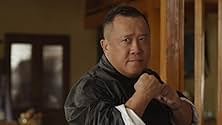NOTE IMDb
6,1/10
12 k
MA NOTE
Hong Kong après-guerre. Le légendaire grand maître du Wing Chun, Ip Man, est à nouveau appelé à l'action lorsque de simples défis lancés par des styles de kung-fu rivaux l'entraîne dans le m... Tout lireHong Kong après-guerre. Le légendaire grand maître du Wing Chun, Ip Man, est à nouveau appelé à l'action lorsque de simples défis lancés par des styles de kung-fu rivaux l'entraîne dans le monde souterrain sombre et dangereux des Triades.Hong Kong après-guerre. Le légendaire grand maître du Wing Chun, Ip Man, est à nouveau appelé à l'action lorsque de simples défis lancés par des styles de kung-fu rivaux l'entraîne dans le monde souterrain sombre et dangereux des Triades.
- Réalisation
- Scénario
- Casting principal
- Récompenses
- 4 victoires et 7 nominations au total
Chuchu Zhou
- Jenny
- (as Zhou Chuchu)
Xiong Xinxin
- Local Dragon
- (as Xin Xin Xiong)
Jonathan Chee Hynn Wong
- Ngai Tong
- (as Jonathan Wong)
Avis à la une
The most interesting aspect between Herman Yau-Anthony Wong collaborations is that their partnership had its roots in Hong Kong Category III horror. Ebola Syndrome is still one of the most disgusting movies I have ever seen and been guiltily entertained by. Forget Outbreak or Contagion, Ebola Syndrome was a far more disturbing movie about a viral outbreak. Forget Hannibal Lecter, Anthony Wong truly played a disturbing sociopath in that movie. The point is: they're not afraid to delve into the gritty, the ugly and the disgusting.
Set against the big commercial movie cog machine and the Ip Man franchise, the majority of Yau-Wong penchant for grittiness is diluted and only some of it remains in Ip Man: The Final Fight. It is that essence of the grittier and the uglier sides of Ip Man that makes out for the more interesting parts in Ip Man: The Final Fight, but it's also the film's major weakness because it never treads far enough from familiar territory.
What the film ends up being more like tonally is a combination of the Wilson Yip- Donnie Yen Ip Man films and Bruce Lee My Brother, where it is loosely glossing over the details of the grandmaster's life and dramatically punching up the action so it can allow for fight scenes, but also providing a retro-gaze of Hong Kong accompanied with a celebrity guest-list cameos.
For example, it's been said that Ip Man sported an opium habit. The concept is telegraphed but never truly explored. Another example is Hong Kong actor Liu Kai Chi gives a cameo as Ip Man's friend who is suffering from poverty. They start what might be a potentially interesting storyline but it never finishes itself. Much of the film is like that.
There are about several subplots running through the story and they all end up as separate vignettes that do not rise above the sum of it's parts. For a biopic drama, that's a problem because it does not provide an unified narrative goal. This is not an editing issue. The story was based on Ip Chun's stories of his father and it is as if seemed like the screenwriter noted them down as told and the director literally shot them that way. So I attribute this issue to lazy writing. The retroactive voice-over device ends up killing a lot of the drama. The scene will be happening and the voice-over will cut in summing up the rest of the scene in past tense. It keeps glossing over by stating what happened instead of letting the audience experience what's happening in the now.
Anthony Wong is very natural as Ip Man. He looks most like the real-life version of Ip Man and actually adopts a Foshan accent. He breathes many colors into the role and the scenes with Ip Man and his students is the heart of the film. Anthony Wong is pretty much the best thing about this movie and his performance alone is the price of admission.
Eric Tsang has a great supporting role as a Crane style master who befriends Ip Man. There is a self-referential joke where Tsang says being a 'clan master' (獎門人) is difficult, a reference to his famous television game show, that was self-serving and unnecessary. Tsang and Wong share an awesome fight together. Not a lot of people remember that Eric Tsang started out as a stuntman; the fight looks very authentic. They were really smashing their forearms together. Eric Tsang is a badass.
Something I noticed about the cinematography was there were way too many crane shots in this film. There's a scene that ends on a connective moment between two characters and then it cuts to a crane shot backing away presenting a view of the entire rooftop set. I have a theory about this. In Hong Kong, booking a crane from a production house is a planned expense and usually you would require more crew members or more time to set up a crane shot. Production houses in the Mainland will give crews an entire film equipment package in their deals, which includes cranes and jibs. With the cheap labor and higher amount of crew members, a crane shot can be set up much faster in the Mainland. As a recent occurrence, a lot of Chinese productions lead by Hong Kong directors have recently been very crane shot-heavy. Hong Kong directors, this needs to stop. You have to remember to pull back every once and a while.
Just as a small footnote, I really hated the Bruce Lee cameo. Playing Bruce Lee in a film is by no means an easy feat but the actor they chose was abysmally awful. He made Bruce Lee look like a rich asshole sellout. It was not fun, nor did it work as a pop culture reference.
Overall, I enjoyed this film, but I do not think it works completely as a standalone piece. It seems to fit as the final piece to this whole line of Ip Man films. In a way, I can't help it because they've made so many movies about Ip Man in such a short time.
With every film, I see a little more of who this man was, what his legacy was and it had me thinking about even what being a good teacher means. I still think The Grandmaster is the best Ip Man film. They really don't need to make any more Ip Man movies. And if they do (and I think they are because I saw a poster for an Ip Man 3 with Donnie Yen), please do the story with Bruce Lee and get him right.
For more reviews, please visit my blog at http://hkauteur.wordpress.com/
Set against the big commercial movie cog machine and the Ip Man franchise, the majority of Yau-Wong penchant for grittiness is diluted and only some of it remains in Ip Man: The Final Fight. It is that essence of the grittier and the uglier sides of Ip Man that makes out for the more interesting parts in Ip Man: The Final Fight, but it's also the film's major weakness because it never treads far enough from familiar territory.
What the film ends up being more like tonally is a combination of the Wilson Yip- Donnie Yen Ip Man films and Bruce Lee My Brother, where it is loosely glossing over the details of the grandmaster's life and dramatically punching up the action so it can allow for fight scenes, but also providing a retro-gaze of Hong Kong accompanied with a celebrity guest-list cameos.
For example, it's been said that Ip Man sported an opium habit. The concept is telegraphed but never truly explored. Another example is Hong Kong actor Liu Kai Chi gives a cameo as Ip Man's friend who is suffering from poverty. They start what might be a potentially interesting storyline but it never finishes itself. Much of the film is like that.
There are about several subplots running through the story and they all end up as separate vignettes that do not rise above the sum of it's parts. For a biopic drama, that's a problem because it does not provide an unified narrative goal. This is not an editing issue. The story was based on Ip Chun's stories of his father and it is as if seemed like the screenwriter noted them down as told and the director literally shot them that way. So I attribute this issue to lazy writing. The retroactive voice-over device ends up killing a lot of the drama. The scene will be happening and the voice-over will cut in summing up the rest of the scene in past tense. It keeps glossing over by stating what happened instead of letting the audience experience what's happening in the now.
Anthony Wong is very natural as Ip Man. He looks most like the real-life version of Ip Man and actually adopts a Foshan accent. He breathes many colors into the role and the scenes with Ip Man and his students is the heart of the film. Anthony Wong is pretty much the best thing about this movie and his performance alone is the price of admission.
Eric Tsang has a great supporting role as a Crane style master who befriends Ip Man. There is a self-referential joke where Tsang says being a 'clan master' (獎門人) is difficult, a reference to his famous television game show, that was self-serving and unnecessary. Tsang and Wong share an awesome fight together. Not a lot of people remember that Eric Tsang started out as a stuntman; the fight looks very authentic. They were really smashing their forearms together. Eric Tsang is a badass.
Something I noticed about the cinematography was there were way too many crane shots in this film. There's a scene that ends on a connective moment between two characters and then it cuts to a crane shot backing away presenting a view of the entire rooftop set. I have a theory about this. In Hong Kong, booking a crane from a production house is a planned expense and usually you would require more crew members or more time to set up a crane shot. Production houses in the Mainland will give crews an entire film equipment package in their deals, which includes cranes and jibs. With the cheap labor and higher amount of crew members, a crane shot can be set up much faster in the Mainland. As a recent occurrence, a lot of Chinese productions lead by Hong Kong directors have recently been very crane shot-heavy. Hong Kong directors, this needs to stop. You have to remember to pull back every once and a while.
Just as a small footnote, I really hated the Bruce Lee cameo. Playing Bruce Lee in a film is by no means an easy feat but the actor they chose was abysmally awful. He made Bruce Lee look like a rich asshole sellout. It was not fun, nor did it work as a pop culture reference.
Overall, I enjoyed this film, but I do not think it works completely as a standalone piece. It seems to fit as the final piece to this whole line of Ip Man films. In a way, I can't help it because they've made so many movies about Ip Man in such a short time.
With every film, I see a little more of who this man was, what his legacy was and it had me thinking about even what being a good teacher means. I still think The Grandmaster is the best Ip Man film. They really don't need to make any more Ip Man movies. And if they do (and I think they are because I saw a poster for an Ip Man 3 with Donnie Yen), please do the story with Bruce Lee and get him right.
For more reviews, please visit my blog at http://hkauteur.wordpress.com/
Good that National Arts Films Production beat Ip Man 3 to the punch on the final chapter of Ip Man's saga. When Donnie Yen announced that he would not do another sequel to Ip Man, I thought what a pity. But now when I see Anthony Wong playing the Ip Man's part, maybe someone like him is a better cast for telling the twilight years of Ip Man's story.
The movie isn't going to be spectacular as Ip Man or Ip Man 2. You already know it from the cast. But it was good in its own ways because Anthony Wong's portrayal of the master was kind of spot on. Life in Hong Kong wasn't so easy in the '50s or '60s, and being an old man in that environment would have been hard even for a grand master of his caliber. The story integrates both Ip Man and Hong Kong pretty well. If there's a problem with this movie, story didn't flow as smoothly as it could have been, but finding story in Ip Man's old age probably wasn't so easy.
I would accept this movie as Ip Man 3. I don't know how good the real Ip Man 3 is going to be, but without Donnie Yen in the starring role, I'm sure it wouldn't have the high tension previous two movies had. As many have commented, this rush to capitalize on the Ip Man's popularity is getting to be passé. This movie was acceptable as the swan song to the saga of Ip Man.
The movie isn't going to be spectacular as Ip Man or Ip Man 2. You already know it from the cast. But it was good in its own ways because Anthony Wong's portrayal of the master was kind of spot on. Life in Hong Kong wasn't so easy in the '50s or '60s, and being an old man in that environment would have been hard even for a grand master of his caliber. The story integrates both Ip Man and Hong Kong pretty well. If there's a problem with this movie, story didn't flow as smoothly as it could have been, but finding story in Ip Man's old age probably wasn't so easy.
I would accept this movie as Ip Man 3. I don't know how good the real Ip Man 3 is going to be, but without Donnie Yen in the starring role, I'm sure it wouldn't have the high tension previous two movies had. As many have commented, this rush to capitalize on the Ip Man's popularity is getting to be passé. This movie was acceptable as the swan song to the saga of Ip Man.
I've spent the 1992 year in Beijing, People's Republic of China. While I was there to work as a foreign expert, I had the chance to work for China Films, where they were writing subtitles for Chinese movies which were exported to abroad customers. Most of the films were Kung Fu movies, and in all of them, the dialogues were so dumb it was laughable. it's not the case with this film. This a well-made movie, with nice battle scenes, but also with an interesting story about a real character. This Master of Wung Shin was the teacher of Bruce Lee. The story is going on from 1949 to the end of the 1960's. It's rather interesting. The version I've watched was in Cantonese, with subtitles, and I recommend it.
I am accustomed to Donnie Yen but this actor was not bad. This film shows Ip Man in his older years which was an interesting portrayal. His team of students was another highlight.
Not the worst HK movie I've ever seen, but pretty far down there. Overall, I think the movie just never figured out what it wanted to be. Does it want to be a biography of Ip Man? Does it want to be a nostalgic piece to serve as a trip down memory lane for older Hong Kong citizens? Is this a movie to profile an iconic figure or a movie to give as much air time to multiple movie stars? In its attempt to honour Ip Man, the movie creates a wooden character of him which leaves little room for character development or interesting acting from Anthony Wong. Weakness is a trait that all humans have, but the movie does its best to remove as much of this trait from its portrayal of Ip Man as possible to immortalize him as some sort of legendary figure. Even in scenes where weakness is demonstrated, so little of it is explored that the audience is left with little to empathize with.
As part of that attempt to honour him, the movie makers tried to tie in as many characters and story lines from Ip Man's real life as possible. But again, its a mess. Few of those characters are developed and we never really get a chance to care about who they are below the surface. For example, I would have loved to see more of who Eric Tsang and Jordan Chan's characters really were.
As a final disappointment, scenes near the end of the movie totally betray the tone and style of the overall movie as well.
Watchable, but unfocused, disjointed and unorganized. A reminder to me why I have slowly drifted away from Hong Kong movies...
As part of that attempt to honour him, the movie makers tried to tie in as many characters and story lines from Ip Man's real life as possible. But again, its a mess. Few of those characters are developed and we never really get a chance to care about who they are below the surface. For example, I would have loved to see more of who Eric Tsang and Jordan Chan's characters really were.
As a final disappointment, scenes near the end of the movie totally betray the tone and style of the overall movie as well.
Watchable, but unfocused, disjointed and unorganized. A reminder to me why I have slowly drifted away from Hong Kong movies...
Le saviez-vous
- AnecdotesIp Man's son, Ip Chun, makes a short cameo in the movie. Appearing when Ip Man was telephoned about his wife died.
- GaffesWhen Ip Man arrives in Hong Kong in 1949, a Volkswagen Type 2 (aka Camper or Minibus) passes in front of him on the street. The first Type 2's were not produced until mid-November 1949 and the vehicle was not available for sale until 1950.
- ConnexionsFollows Ip Man: la légende est née (2010)
- Bandes originalesPing Shui Xiang Feng
Composed by Yao Nin
Lyrics by Yang Yan Qi
Sung by Wu Ying Yin
[OP: EMI Music Publishing Hong Kong
License courtesy of EMI Music Hong Kong, admin by Warner Music Hong Kong Ltd]
Meilleurs choix
Connectez-vous pour évaluer et suivre la liste de favoris afin de recevoir des recommandations personnalisées
- How long is Ip Man: The Final Fight?Alimenté par Alexa
Détails
Box-office
- Montant brut aux États-Unis et au Canada
- 37 884 $US
- Week-end de sortie aux États-Unis et au Canada
- 15 514 $US
- 22 sept. 2013
- Montant brut mondial
- 3 967 001 $US
- Durée1 heure 40 minutes
- Couleur
- Mixage
- Rapport de forme
- 2.35 : 1
Contribuer à cette page
Suggérer une modification ou ajouter du contenu manquant

Lacune principale
What is the English language plot outline for Ip Man: Le combat final (2013)?
Répondre



